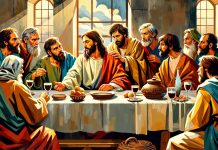From the speech of Jesus, who was a perfect speaker, we would expect there to be no fiery insults or harsh terms.
However, some of His words are out of the ordinary and seem to cast a shadow over His oratory or speech. This article examines several of these words and provides a verdict.
Herod, the fox
In Luke 13:31-33 we read that some Pharisees came to Jesus, and whether they knew for sure or only suspected it, they told Him that Herod wanted to kill Him. In response, He said to them, “Go tell that fox, ‘I will keep on driving out demons and healing people today and tomorrow, and on the third day I will reach my goal’. In any case, I must press on today and tomorrow and the next day—for surely no prophet can die outside Jerusalem!’”. What draws our attention is the name Jesus uses for King Herod: “fox”.
A woman shouted at Gheorghe Ștefan, who later became ruler of mid-17th-century Moldovia, that he was a “cheeky hound”. He was offended.[1] If someone is compared to an animal or, more specifically, to an ox, a donkey, etc., the modern ear will hear these words as invectives. Did Jesus offend Herod when He called him a fox?
Luke characterises the tetrarch of Galilee as an evildoer (Luke 3:19-20), who imprisoned and then killed John the Baptist (Luke 9:9). In ancient literature, the fox is depicted as a cunning creature. In the fable “The Fox and the Goat”, Phaedrus[2] depicts the animal as a cunning opportunist. The fox is also a symbol of interested flattery.[3]
Closer to the New Testament period, Epictetus noted that most people are content to live their lives at the level of animals—that is, without exercising their reason and mind faculties in general. Thus, some are insidious, treacherous, and destructive like wolves, others, like wild and untamed like lions, but most are compared to foxes.[4] Although Epictetus does not explain the meaning of being “like foxes”, it is understood from the context that being a fox presupposes being a human who lives below their noble abilities.
However, it seems that rabbinic literature portrays the fox in comparison to a more indomitable creature such as the lion.[5] Jesus is more likely to have used the rabbinic sense. By calling him a “fox,” Jesus does not seem to be referring to the cunning of the animal, but rather to his inability to carry out his threat.[6] Herod is a fox because he is powerless to stop Jesus from fulfilling His mission.
Pharisees, serpents, and brood of vipers
Most of Jesus’s quarrels were with the Pharisees, and the debates with them sometimes contain harsh words. The phrase we deal with in this section is “brood of vipers”. In Matthew 12:33-34, we read: “‘Make a tree good and its fruit will be good, or make a tree bad and its fruit will be bad, for a tree is recognized by its fruit. You brood of vipers, how can you who are evil say anything good? For the mouth speaks what the heart is full of.”
Here, “brood of vipers” is a general term that denotes verbal abuse: Jesus is gratuitously accused of performing miracles using the devil’s power.[7] The same language is also used by John the Baptist (Matthew 3:7) to emphasise the intention of the Pharisees and Sadducees to receive his baptism only out of fear of hell, not out of genuine repentance.
In a different circumstance, Jesus rebuked the scribes and Pharisees: “‘Woe to you, teachers of the law and Pharisees, you hypocrites! You build tombs for the prophets and decorate the graves of the righteous. And you say, ‘If we had lived in the days of our ancestors, we would not have taken part with them in shedding the blood of the prophets.’ So you testify against yourselves that you are the descendants of those who murdered the prophets. Go ahead, then, and complete what your ancestors started! You snakes! You brood of vipers! How will you escape being condemned to hell?” (Matthew 23:29-33). In this text, the Pharisees are described as snakes and vipers who attack the prophets,[8] although they seem to mourn the prophets of old who fell victim to their fathers.
Blind and foolish Pharisees
Twice in Matthew 23:17-19, Jesus calls the Pharisees “blind and foolish”. First, because, while they regarded the temple as sacred, they did not view other objects with the same consideration; second, because they mistakenly considered the sacrifices and gifts on the altar to be more important than the altar itself.
In what sense does Jesus call them “blind and foolish”? Doesn’t He contradict Himself when He says that if someone calls their neighbour a “fool,” they are guilty of breaking the sixth commandment (Matthew 5:22)? The short answer to the second question is no. In the Sermon on the Mount, Jesus refers to an Aramaic word (raca), a curse of the time, which was insulting.
But when He addresses the Pharisees, He uses the term mōros, which means inconsiderate, mindless.[9] The meaning of this foolishness must be drawn from the Hebrew poetic literature, where foolish are those who do not fear God (Proverbs 2:5; 8:13) and who act as if He did not exist (Psalm 14:1; 53:1). Foolishness is, therefore, not the equivalent of an insult, but rather a lack of wisdom.
Pharisees, whitewashed tombs
In the same incisive discourse, Jesus calls the Pharisees “whitewashed tombs,” showing that they are more interested in appearance and external things than what lies in their hearts. In Jesus’s words, “You are like whitewashed tombs, which look beautiful on the outside but on the inside are full of the bones of the dead and everything unclean” (Matthew 23:27). To the Jews, the realm of death was unclean.
Once a year (on the 15th of Adar), the Jews whitewashed the tombs to make them stand out so they would avoid touching them unintentionally and thereby defile themselves.[10] The comparison is therefore very suggestive. They looked good on the outside, but their souls were unclean or dead. Clothes and reputation don’t really make the man.
If we were to deliberate, I think we are not wrong in saying that, culturally and rhetorically, Jesus did not offend. He used familiar, albeit harsh, images that to modern sensibilities could be considered rude.
What He tried, while associating His interlocutors with one image or another, was to give them, through these comparisons, the chance to take a look at themselves in the mirror and to reflect on their attitudes behind appearances. What better could He do to the Pharisee than to confront him with himself?
Laurenţiu Moţ examines the words that Jesus sometimes used in order to offer an introspective framework to the ones who are evil and do not see themselves as they are.




















